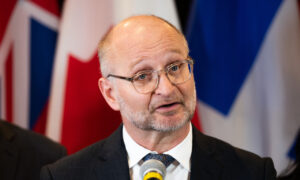By Sophie Perry
Copyright thepinknews

America is the land of the free, so the lyrics of “The Star-Spangled Banner” has declared for more than 200 years. Except, as increasingly seems to be the case, that doesn’t apply if you disagree with Donald Trump, causing many to ask: is free speech dead in America?
Through the First Amendment, freedom of speech is deeply embedded in the legal, political and social history of the United States and is one of its citizens’ most cherished values.
Ratified on 15 December 1791, the First Amendment outlines: “Congress shall make no law respecting an establishment of religion, or prohibiting the free exercise thereof; or abridging the freedom of speech, or of the press; or the right of the people peaceably to assemble, and to petition the Government for a redress of grievances.”
So important is free speech to Americans that in the run up to the 2024 Presidential Election it was a top issue on voters’ minds – ahead of traditionally hot button issues like crime, immigration and gun policy.
On 20 January, during his inaugural address, Trump vowed to “immediately stop all government censorship and bring back free speech to America” – because, apparently, it had totally disappeared under Joe Biden. Weird.
Just hours later Trump signed an executive order entitled ‘Restoring freedom of speech and ending federal censorship’ in which he said the Biden administration had “trampled free speech rights by censoring Americans’ speech on online platforms”.
Trump claimed the Democratic government exerted “substantial coercive pressure” on social media companies and other third party organisations to “moderate, deplatform, or otherwise suppress speech that the Federal Government did not approve (of).”
“Under the guise of combatting ‘misinformation,’ ‘disinformation,’ and ‘malinformation,’ the Federal Government infringed on the constitutionally protected speech rights of American citizens across the United States in a manner that advanced the Government’s preferred narrative about significant matters of public debate,” the order went on to read.
The matters of public debate Trump cited no doubt refer to the countless occasions social media platforms have removed Covid-19 and election conspiracy theories – amongst other misinformation – published by right-leaning individuals.
Indeed, Trump’s own social media accounts were suspended in 2021 “due to the risk of further incitement of violence” after he described his supporters who stormed the US Capitol on 6 January as “patriots”. The MAGA crowd have long decried such suspensions and post removals as infringing on their First Amendment rights and alleged they are part of a radical left-wing drive to silence conservative thinking and indoctrinate the US with so-called ‘woke’ ideology.
“Government censorship of speech,” the order added, “is intolerable in a free society.”
Nine months later… free speech absolutism is seemingly long forgotten
Fast forward just nine months and in the wake of the shooting of Charlie Kirk, a right-wing influencer and Trump ally, the president’s campaign to champion free speech absolutism is seemingly long forgotten – although, it was already a hollow pledge.
Freedom of speech, his administration has been making clear over the last few months and even more so in recent days, is very much for those who are on their side.
Turning Point USA founder Kirk was leading an open-air debate on the campus of Utah Valley University in Orem last week when he was shot in the neck. He later died in hospital.
In the seconds before the gun shot, which is believed to have been fired from the roof of a nearby university building, the 31-year-old had been discussing the conservative conspiracy theory about trans shooters.
Following a huge manhunt, 22-year-old Utah resident Tyler Robinson was subsequently arrested and has been charged with several counts, including aggravated murder, and could face the death penalty.
Kirk’s death had had a deep impact on conservatives who thoroughly connected with his staunchly traditionalist values and views on issues including gun rights advocacy, abortion and LGBTQ+ rights.
Across the US, several vigils were held for Kirk where fans with tear-stained cheeks lit candles, wrote heartfelt messages and draped American flags over his image. Many have come to see Kirk as a martyr, seemingly killed for speaking his truth in a country where freedom of speech is guaranteed by the constitution
By contrast, others – often on the opposite side of the political spectrum – have been critical of the right’s sugar-coating of Kirk’s legacy and claimed his death is being capitalised on to push anti-left, and namely anti-trans, rhetoric. Indeed, in the hours after he was killed, when details about the crime were thin on the ground, conservative pundits were widely sharing misinformation that the shooter was a trans person.
It is this condemnation of Kirk, and right-wing narratives, that has lit a fire under conservatives, with many senior Trump officials in recent days fervently calling for one sort of censorship or another of Kirk critics and more broadly anyone who does not agree with Republican thinking and Trump himself.
“That leaves Jimmy and Seth, two total losers, on Fake News NBC. Do it NBC!!!”
Jimmy Kimmel has been taken off the air following pressure from a federal agency led by a Trump appointee and in celebration Trump wrote on Truth Social that Seth Meyers and Jimmy Fallon should be suspended next.
|Great News for America: The ratings challenged Jimmy Kimmel Show is CANCELLED,” Trump wrote. “Congratulations to ABC for finally having the courage to do what had to be done. Kimmel has ZERO talent, and worse ratings than even Colbert, if that’s possible. That leaves Jimmy and Seth, two total losers, on Fake News NBC. Their ratings are also horrible. Do it NBC!!!”
Vice president JD Vance said, while hosting the latest episode of Kirk’s podcast, that anyone celebrating the influencer’s killing should be reported to their employer to face career consequences. In the week since Kirk’s death, several dozen employees at various different companies, agencies and institutions have been fired or suspended for their views seen as inappropriate or insensitive.
Similarly, defence secretary Pete Hegseth and his assistant Sean Parnell said the department is “tracking” military personnel that make “unacceptable” comments which “celebrate or mock” Kirk’s death and the State Department said it will revoke visas because America “will not host foreigners who celebrate the death of our fellow citizens”.
“[I] should probably go after people like you, because you treat me so unfairly”
Attorney general Pam Bondi pledged to “absolutely target” those who are going after people with “hate speech”, saying there is “no place, especially now” for it. When Trump was asked about these comments by ABC’s chief Washington correspondent Jonathan Karl because “a lot of your allies say hate speech is free speech”, the president threatened him: “[I] should probably go after people like you, because you treat me so unfairly. You have a lot of hate in your heart. Maybe they’ll come after ABC.”
The Trump administration is also reportedly also creating a new executive order on political violence and hate speech, according to White House sources, which could see left-wing organisations, movements and thought specifically targeted by the US government.
Claims about that alleged executive order come as Trump announced he would declare Antifa a terrorist organisation.
“I am pleased to inform our many U.S.A. Patriots that I am designating ANTIFA, A SICK, DANGEROUS, RADICAL LEFT DISASTER, AS A MAJOR TERRORIST ORGANIZATION,” Trump wrote on his Truth Social account.
Antifa, short for anti-fascist, is not a term which applies to a specific, organised group but instead refers to a broad movement of left-leaning organisations and grassroots groups which oppose fascism and far-right ideology including white supremacy and neo-Nazism.
Seeking to outlaw such a wide-ranging and difficult to define movement as though it is a singular organisation inexplicably echoes Russia’s decision to label the “international public LGBT movement” as “extremist”.
Previous to Trump’s announcement, the White House’s deputy chief of staff, Stephen Miller, vowed revenge for Kirk’s killing and described left-wing political organisations as a “vast domestic terror movement”.
“With God as my witness, we are going to use every resource we have at the Department of Justice, Homeland Security and throughout this government to identify, disrupt, dismantle and destroy these networks and make America safe again for the American people,” he said. “It will happen, and we will do it in Charlie’s name.”
All in all, it is the kind of censorship and cancel culture that Republicans have long accused the left of doing.
“Trump doesn’t want free speech. He wants favored speech. For himself. And he’s using our government, and now Kirk’s killing, to reach for that,” USA Today’s Chris Brennan commented in an opinion piece.
Erwin Chemerinsky, dean of the University of California at Berkeley School of Law and a First Amendment scholar, told The Washington post Trump is “very much wanting to use the tools of the government to try to silence the speech that he doesn’t like”.
“It’s not a new playbook for people to use power in that way, but we’ve never seen a president do anything like this before.”
Trump officials seeking to clamp down on freedom of speech in Kirk’s name is not without irony, given Kirk himself – for better or worse – was a firm proponent of the First Amendment.
“Hate speech does not exist legally in America,” Kirk once wrote on his X account. “There’s ugly speech. There’s gross speech. There’s evil speech. And ALL of it is protected by the First Amendment. Keep America free.”



